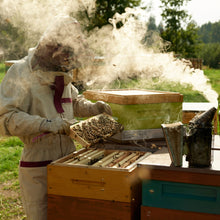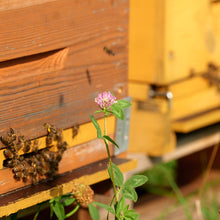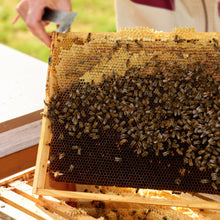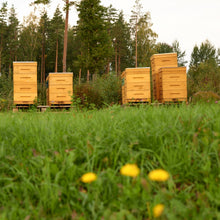
Bee propolis, often called "bee glue," is a natural resin that bees produce from the resinous materials they collect from tree buds, sap flows, and other plant sources. Bees use propolis to seal cracks in their hives, protect their colonies from pests, and sterilize their living environment.
It is considered one of nature's most powerful health boosters. Rich in antioxidants, propolis also has anti-inflammatory and antimicrobial properties. This sticky substance has been used for centuries in traditional medicine and is becoming increasingly popular in modern health and wellness practices. As with any supplement, it's important to use propolis wisely and consult with a healthcare professional if needed.
Ingredients: Pure Raw Propolis (100%)
Net weight: 150g
Propolis is a complex mixture made up of several components, including:
-Approximately 50% resin, which is a polyphenolic fraction consisting of flavonoids and related phenolic acids.
-About 30% beeswax, which includes various waxes and fatty acids.
-Roughly 10% essential and aromatic oils.
-5% bee pollen, which contains pollen proteins and free amino acids.
-The remaining 5% consists of other substances, including organics and minerals.
Additionally, propolis contains a variety of vitamins, such as vitamin B1, B2, B6, C, and E, along with nicotinic acid and folic acid. It also includes minerals like calcium, magnesium, iron, copper, zinc, manganese, nickel, cobalt, vanadium, and strontium. Other components present are sugars, enzymes, aldehydes, ketones, alcohols, and steroids.
The exact composition of propolis can vary significantly depending on the geographic location and the botanical sources available to the bees.
What Does it Taste Like?
Raw propolis has a unique taste and smell that can be quite distinct, and preferences for it can vary widely among individuals. Raw propolis has a strong, resinous taste that can be somewhat bitter and earthy. This comes from the plant resins and waxes that bees collect. Some people describe the taste as astringent, which means it may leave a dry feeling in the mouth. Beneath the bitterness, there may be subtle undertones of sweetness from the beeswax and other components.
Earthy Aroma: The smell of raw propolis is often described as earthy and herbal, with hints of woodiness. It can evoke the scent of a forest or resinous trees. Depending on the source of the resins, raw propolis might also have notes reminiscent of pine, fir, or balsam, reflecting the botanical origins of the substances the bees collected.
Facts & & Health Properties
Antimicrobial Properties: Propolis has been shown to have antibacterial, antifungal, and antiviral properties, making it a popular ingredient in natural health products.
Anti-inflammatory Effects: Some studies suggest that propolis can help reduce inflammation, which may be beneficial for various health conditions.
Wound Healing: Propolis is often used in ointments and sprays for minor cuts and burns due to its potential to promote healing and prevent infections.
Oral Health: Propolis is sometimes used in mouth rinses and toothpastes because of its ability to inhibit the growth of oral bacteria and promote oral hygiene.
Immune System Support: Many people take propolis supplements to support immune function, especially during cold and flu season.
Herpes & Canker Sores: Studies suggest that propolis may help reduce symptoms and speed up healing of cold sores and mouth ulcers.
Skin Care: Propolis is included in creams and serums to help with acne, eczema, and other skin conditions.
Lowers Blood Pressure: Some studies suggest that propolis can help regulate blood pressure by improving nitric oxide levels.
Controls Blood Sugar Levels: Research indicates that propolis may help regulate fasting blood glucose levels, benefiting those with diabetes.
Propolis is one of nature's most renowned superfoods, known for its powerful antibacterial, antiviral, antifungal, and anti-inflammatory properties. It can be viewed as a potent natural remedy or a type of natural antibiotic. This remarkable substance serves as an excellent treatment and dietary supplement for maintaining vitality, boosting the immune system, and alleviating ailments, especially during the autumn and winter months as well as during seasonal changes. It aids in enhancing natural resistance and recovery from common illnesses. The immune-boosting and antioxidant benefits of propolis contribute significantly to overall health and well-being, which is especially important for city dwellers and individuals with stressful lifestyles.
How to Use Raw Propolis: Chewing raw propolis can be an option for some individuals. Direct consumption, particularly for individuals who are familiar with the taste. Start with a small piece, such as a pea-sized amount. You can also use the Propolis to make Tinctures: Extracts made by dissolving propolis in alcohol or glycerin. You can make your own ointments and creams, which are used for topical applications.
Propolis products can be used for both external and internal applications. They are commonly utilized to treat skin conditions and to soothe the nasal mucosa during colds. Additionally, these products serve a preventive role, particularly in cases of inflammation in the oral cavity and throat. Propolis is also beneficial for digestive tract issues, in proctology, gynecology, and for boosting the immune system.
How Much Should You Consume?
It's essential to note that reactions to the taste and smell of raw propolis can be subjective. Some individuals may find it pleasant or tolerable, while others may dislike it. If you're trying raw propolis for the first time, be prepared for its robust characteristics, and consider starting with a small piece to gauge your response.
How to Store?
Store propolis at room temperature or in a cool dark place, away from direct sunlight, ideally between 60°F to 75°F (15°C to 24°C). Avoid exposing it to higher temperatures, as heat can degrade its beneficial compounds. While refrigeration is not typically necessary, it can help prolong the shelf life of raw propolis. Ensure that the propolis is stored in airtight containers to prevent moisture and air exposure.
Clean Hands and Utensils: Always use clean hands or utensils when handling propolis to minimise contamination, especially for its raw form.
Please Know:
Propolis supplements are generally safe and healthy to use, however, do not use Propolis if you have asthma or if you are allergic to honey, bee pollen, peru balsam, conifers, or poplars. It's always advisable to conduct a patch test or consult with a healthcare provider before using propolis, particularly for people with allergies or pre-existing health conditions.
Allergy Testing: If you're trying propolis for the first time, consider doing a patch test to check for allergic reactions. Apply a small amount to your inner arm and wait 24 hours to see if any irritation occurs.
Delivery
Shipping calculated at the checkout.
For detailed shipping information please see our Shipping Policy.
* Product photos and videos are representative.

























